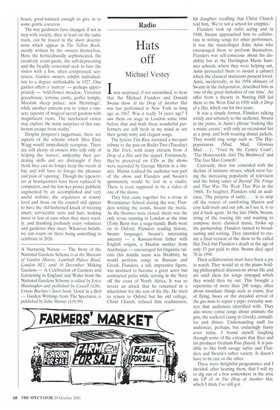Hats off
Michael Vestey
Iwas surprised, if not astonished, to hear that the Michael Flanders and Donald Swann show At the Drop of Another Hat was last performed in New York as long ago as 1967. Was it really 34 years ago? I saw them on stage in London some time before that and both these wonderful performers are still fresh in my mind as are their gently witty and elegant songs.
The lyricist Tim Rice narrated a two-part tribute to the pair on Radio Two (Tuesday) in Hat Trick, with many extracts from A Drop of a Hat and the sequel. Fortunately, they're preserved on CDs as the shows were recorded by George Martin in a theatre. Martin realised the audience was part of the show and Flanders and Swann's spontaneity would be lost in a studio. There is even supposed to be a video of one of the shows.
They first came together for a revue at Westminster School during the war, Flanders writing the words, Swann the music. As the theatres were closed, theirs was the only revue running in London at the time (Tony Benn was a stage-hand). Both went on to Oxford, Flanders reading history, Swann languages. Swann's interesting ancestry — a Russian-born father with English origins, a Muslim mother from Azerbaijan — encouraged his linguistic talents (his middle name was Ibrahim); he would perform songs in Russian and Greek. Flanders, a tall, impressive figure, was destined to become a great actor but contracted polio while serving in the Navy off the coast of North Africa. It was so severe an attack that he remained in a wheelchair for the rest of his life. He tried to return to Oxford but his old college, Christ Church, refused him readmission, his daughter recalling that Christ Church told him, 'We're not a school for cripples.'
Flanders took up radio acting and in 1948, Swann approached him to collaborate in writing songs for other performers. It was the musicologist John Amis who encouraged them to perform themselves. Flanders was self-conscious about his disability but at the Dartington Music Summer schools, where they were helping out, Arnis persuaded them to mount a cabaret which the classical musicians present loved. Antis, incidentally, in his 1994 obituary of Swann in the Independent, described him as 'one of the great melodists of our time'. An offer from a theatre in Notting Hill led them to the West End in 1956 with A Drop of a Hat, which ran for two years.
It was a simple format, Flanders talking wittily and urbanely to the audience, Swann at the piano, in Amis's phrase 'looking like a manic curate', with only an occasional hat as a prop, and both wearing dinner jackets. They would sing songs such as 'The Hip popotamus (Mud, Mud, Glorious Mud )', 'Tried by the Centre Court', 'The Honeysuckle And The Bindweed' and 'The Gas Man Cometh'.
Curiously, their rise coincided with the decline of intimate revues, which were facing the increasing popularity of television and the biting satire of Beyond The Fringe and That Was The Week That Was in the 1960s. To laughter, Flanders told an audience, 'The purpose of satire . . . is to strip off the veneer of comforting illusion and cosy half-truth and our job, as I see it, is to put it back again.' In the late 1960s, Swann, tiring of the touring life and wanting to compose more classical music, broke up the partnership. Flanders turned to broadcasting and writing. They intended to create a final version of the show to be called Hat Trick but Flanders's death at the age of only 53 put paid to that. Swann died aged 70 in 1994.
Their collaboration must have been a joy to watch. They would sit at the piano holding philosophical discussions about life and art until ideas for songs emerged which they would then try out. This brought a repertoire of more than 200 songs, often about mundane things such as trams, fear of flying, buses or the dreaded arrival of the gas man to repair a pipe: everyday matters that audiences identified with. They also wrote comic songs about animals: the gnu, the cockerel (sung in Greek), armadillos and rhinos. Undemanding stuff for audiences, perhaps, but enduringly funny even today. I found myself laughing through some of the extracts that Rice and his producer Graham Pass played. It is possible to like both savage satire and Flanders and Swarm's softer variety. It doesn't have to be one or the other.
These were delightful programmes and I decided, after hearing them, that I will try to dig out of a box somewhere in the attic my LP of At The Drop of Another Hat, which I think I've still got.


























































































 Previous page
Previous page